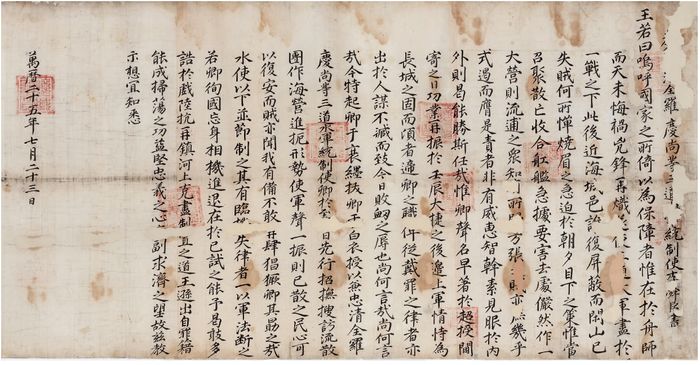"(Translation) 御製戒酒綸音"의 두 판 사이의 차이
(→Original Script) |
(→Student 1) |
||
| 28번째 줄: | 28번째 줄: | ||
==='''Student 1'''=== | ==='''Student 1'''=== | ||
| + | 1. This minister carefully observes: in accordance with the long-standing tradition of the founding emperors, Your Majesty has specially ordered close ministers to seek out and recommend the talents of all-under-heaven, to observe those who stand out by allowing them to speak out on current affairs, and to give them non-regular titles for special appointment in office, aside from the regular civil service examinations. Therefore, all talents of the world, wishing to participate in it, are delighted to present themselves. 2. Generally speaking, to open up to all-under-heaven through the gate of no discrimination, and to accept and elevate the meek and base to the highest positions, are these not the great virtues of Kings Yao and Shun? However, for being so unworthy, this minister alone is quite apprehensive about this. Why is he so? 3. The way of governing is in essence not to be said so easily as such, but Your Majesty should of necessity seek it through the means of language. Should this minister speak parsimoniously, then his words would be too sketchy and not worthy of hearing. Should he speak out exhaustively, then his words could be easy to listen to, but might not be reliable. 4. Moreover, if unintelligent people in the world also speak out rather forcibly, then all the words of the world would be expressed all at once in mixture so that those above would not be able to make a selection. As a result, all will be considered empty words and discarded. In general, [Your Majesty] has burdened us ministers with the learning of utility, but [our opinions] could not avoid being empty words and be discarded; although this is not Your Majesty’s intention, this given conditions seem necessarily so. | ||
==='''Student 2'''=== | ==='''Student 2'''=== | ||
2017년 6월 29일 (목) 15:07 판
| Primary Source | ||
|---|---|---|
 |
Title | |
| English | Decree Appointing Yi Sunsin to Concurrently Hold the Position of Naval Commander of the Three Provinces of Ch'ungch'ŏng, Chŏlla, and Kyŏngsang | |
| Chinese | 敎 兼忠淸全羅慶尙等三道水軍統制使 李舜臣書 | |
| Korean(RR) | 교 겸총청전나경상등삼도수군통제사 이순신서 | |
| Text Details | ||
| Genre | Royal Documents | |
| Type | Decree | |
| Author(s) | King Sŏnjo | |
| Year | 1597 | |
| Source | ||
| Key Concepts | Imjin War, Yi Sunsin, Japan-Korea Relations | |
| Translation Info | ||
| Translator(s) | Participants of 2016 Summer Hanmun Workshop (Advanced Translation Group) | |
| Editor(s) | Hyeok Hweon Kang, Orion Lethbridge | |
| Year | 2016 | |
목차
Introduction
Original Script
1. 臣竊以陛下循祖宗之舊, 特詔近臣, 於科舉之外薦聞天下之豪儁, 許以極言當世之事, 而考察其尤異者, 秩以不次之爵, 待以非常之用, 而天下之豪儁, 亦莫不欣喜自效, 願致於其間. 2. 夫開天下以不諱之門, 納疏賤於至髙之選, 此豈非堯舜之盛德哉? 而臣之不肖, 則獨有所甚憂於此. 何者? 3. 治道本不如是之易言也, 而陛下必以言求之. 使臣而少言之歟? 則略而不足聽, 盡言之歟? 則可以聽而未必信. 4. 而天下之不知者又將强言之, 於是天下之言雜然並進, 而其上莫能擇也, 則一切以爲空言而盡廢之. 夫以有用之學責臣等, 而卒不免以空言廢之, 此非陛下之意也, 而其勢有必然者.
참고자료
- View together with 정조 윤음 번역
번역
Student 1
1. This minister carefully observes: in accordance with the long-standing tradition of the founding emperors, Your Majesty has specially ordered close ministers to seek out and recommend the talents of all-under-heaven, to observe those who stand out by allowing them to speak out on current affairs, and to give them non-regular titles for special appointment in office, aside from the regular civil service examinations. Therefore, all talents of the world, wishing to participate in it, are delighted to present themselves. 2. Generally speaking, to open up to all-under-heaven through the gate of no discrimination, and to accept and elevate the meek and base to the highest positions, are these not the great virtues of Kings Yao and Shun? However, for being so unworthy, this minister alone is quite apprehensive about this. Why is he so? 3. The way of governing is in essence not to be said so easily as such, but Your Majesty should of necessity seek it through the means of language. Should this minister speak parsimoniously, then his words would be too sketchy and not worthy of hearing. Should he speak out exhaustively, then his words could be easy to listen to, but might not be reliable. 4. Moreover, if unintelligent people in the world also speak out rather forcibly, then all the words of the world would be expressed all at once in mixture so that those above would not be able to make a selection. As a result, all will be considered empty words and discarded. In general, [Your Majesty] has burdened us ministers with the learning of utility, but [our opinions] could not avoid being empty words and be discarded; although this is not Your Majesty’s intention, this given conditions seem necessarily so.